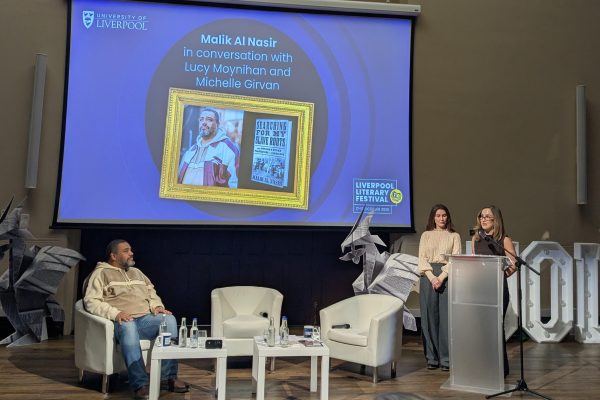6th November 2023
Listen
Listen

Running for its tenth year, the Liverpool Literary Festival 2025 has again welcomed literary enthusiasts to the Victoria Gallery and Museum to attend talks from a range of writers in celebration of all-things literature. On the 18th of October, I had the opportunity to attend the interview of author, poet and academic, Malik Al Nasir, who was there to discuss his book Searching for My Slave Roots: From Guyana’s Sugar Plantations to Cambridge.
Introduced by history PhD students Lucy Moynihan and Michelle Girvan, the talk began with an insight into their research which uncovers the legacies of slavery and colonialism in the Liverpool institutions of the Blue Coat and the Athenaeum. This underlined the undeniable relevance of slavery studies to Liverpool (as well as to the rest of Britain), exposing how our institutions were built from violent profits. Noting that there is a disconnect between history and what we are led to believe, Al Nasir outlined his drive to understand the reality of our past. He made clear that in order to know who we are and where we are heading, we need to know where we came from. And for Al Nasir, this idea of “where he comes from” has always been present in his life, as from a very young age he has been told to “go back” there. Recalling the demeaning images and portrayals of Black people in the media during his childhood, Al Nasir made clear that this racism was omnipresent during his formative years. This personal, lived experience of racism formed the starting point for the novel.
Moynihan and Girvan drew attention to the way in which Al Nasir’s novel weaves together personal testimony with historical events, underlining how it differs to a traditional, academic approach to historiography. Al Nasir highlighted how taking a personal approach is more inclusive, as traditional approaches can miss important information. The unique perspective of employing a genealogical lens and looking at the past through his family tree has enabled his research to be more thorough, thus providing a more truthful and clearer image of the past.
The Q&A session that followed provided further insight into Al Nasir’s motivations behind his work. Expanding on the relevance of slavery in Liverpool’s institutions, and then going on to speak about abolitionism, Al Nasir demonstrated the importance in re-thinking the way we remember history. For example, he questioned the celebration of white abolitionists, stressing that slavery studies must be approached with nuance, as in reality, white abolitionists were slow and reluctant, often only acting as a result of losing control. As Al Nasir put it, the narrative that paints abolitionism as an act of white benevolence towards Black people is nonsense, and history should look at the raw picture instead of carrying on the propagandist tropes that brought about said history in the first place. The Q&A session also prompted discussion about Al Nasir’s other work, including a formidable performance of his poem “Power” which describes his experiences of growing up within the care system.
The talk concluded and the audience were left with an elevated understanding of the importance of approaching our history with nuance, and an obligation to question long-held narratives in the way we remember slavery.
To read our other reviews of the Liverpool Literary Festival, please click here:
https://www.liverpoolguildstudentmedia.co.uk/category/arts-culture